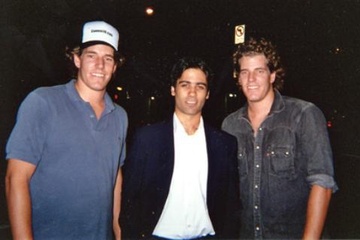I try not to drop the T-bomb if I can help it. I get on just fine by saying I have three siblings and letting people’s polite interest in my past be satisfied. Months or even years later, it’ll slip in by accident. People who think they know me inside and out discover that I am an entirely different personn—that they’ve never known the real me. At least, you’d think so based on their reaction when I say, “Yeah, I was skyping the other night with my twin—oh shit.”
Once someone finds out I have a twin, the next 20 or so seconds of conversation are fairly predictable. Step 1: Denial. “What? No way!” This tends not to last long, but you’d be surprised at the convincing I’ve had to do. Step 2: Incredulity. “I can’t believe I’ve known you all this time and I’m just finding out you have a twin! This changes EVERYTHING.” Step 3: Blaming. “Why didn’t you tell me this when we first met?” Step 4: Awe. “Wow. It must have been great growing up with a twin. It must have been really special for you.” Step 5: The question which without fail terminates the conversation: “Identical or fraternal?” Step 6: Disappointment. “Oh, you’re fraternal? Well…ok.”
Indeed, we are the boring kind of twin. I have a brother who happens to only be 25 minutes older than me, with nothing crazy like mind reading or zany comedic value. My twin is shorter, blonder, and sweeter than I am, and sometimes we hardly seem related. I’m convinced we wouldn’t have been friends at all if we hadn’t spent most of our lives (and then some) in such close proximity.
But tell us a joke and we’ll glance at each other and gain quick, tacit approval to find it funny together. We’re less chatty than you’d think because we’ve already had most conversations and there isn’t much more to say that we don’t already understand. He’s not merely a brother who happens to be the same age as me. There’s something added into the mix. Sharing a womb, crib, bed, and bunk bed through freshman year of high school turned our lives into a logistical dance of close proximity which we resolved with surprising ease—except for that one lego he left out that tore a bloody crater into my foot. We shared space and bumped elbows and talked into the night, and as a result we’re somewhere on the spectrum between friends, family, and self.
So when my twin flew out for our joint 21st birthday last year, I seized the opportunity to introduce my other half to my college friends who thought they knew me. At the party we threw in my room, I wanted to stand up on top of a table and point at my brother and yell, “This! This, right here!” Instead, I trotted him up to my closest friends one by one and introduced him: “I’d like you to meet my twin.” They immediately launched into feverish conversation while I retreated a bit, giving them space but watching them out of the corner of my eye. They glanced at me every so often with a mix of amusement, approval, confusion and understanding. Far too soon my friends went back to mingling and my twin rejoined me, and it took all of my willpower not to grab their scalps and force their heads back together until I felt they truly knew each other. People haven’t met me until they’ve met my twin.
College has changed the two of us. Nascent bits of our personality surged under our newfound independence. We haven’t stayed in as close contact as either of us would have hoped. In the past, we didn’t have to try in order to know what was going on in the other’s mind at any given moment, so we made no such efforts. Of course spending three years apart has caused our lives to diverge, and yet we communicate electronically as if we still saw each other every day. Sometimes, it’s difficult to know whether we’re just kidding ourselves into thinking we’re as close as we once were, or if there is some nature within us that is both shared and immutable.
Last week was my 22nd birthday. I pushed myself up and back into the booth at the bar, marginally diminishing the babble of my celebrating friends around me. My finger caught on the cracks in my phone screen as I dialed my twin. It was 12:05 AM in Cambridge, making it 10:05 PM the day before in Colorado, where he goes to school.
“Hey, man. Guess who’s the older twin now?”
He was waiting for this. “Yeah, well, you’re gonna die before me so enjoy it while it lasts, grandpa.”
This banter is our consolation prize for being apart. But I heard the raucous noise of celebration on his end and he heard the huddled friends at the bar on mine. We’ve carved out two distinct spheres for ourselves, which in itself seems kind of unbelievable. “Listen bud, I’ll call you when it’s midnight over there.”
“Alright Kevin, have a great night. Happy birthday.”
I hung up and pulled myself forward to re-engage. We would have great nights in our different states, but it was still our night. And we understood that without saying anything.
Kevin T. Wittenberg ’14 is a human developmental and regenerative biology concentrator in Winthrop House. He’s been getting over “Step 6: Disappointment” for 22 years.



